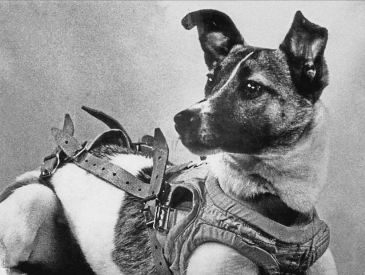It happened today - November 3, 2015
 On Nov. 3, 1957, the Soviets put the first dog in space. And killed it there. They would.
On Nov. 3, 1957, the Soviets put the first dog in space. And killed it there. They would.
It was superficially an impressive achievement. As it had already been for the Soviets to put the Sputnik satellite into space less than a month earlier. And scary, because the very same technology that could put a satellite up in orbit could also put a nuclear warhead up and then down again, rendering all the West’s strategic defences obsolete. But it’s one thing to be able to put a radio transmitter or even a nuclear bomb up there and quite another to do it with a living thing. It requires a more elaborate and more fragile payload.
To do both within a month created a panicky feeling in the West that those no good Commies had somehow sneakily gotten really good at science and inventions instead of the supposedly creative free people of the democracies. But it was, like virtually everything about the Soviet Union (and, today, China), either an outright fraud or an illusion because it was achieved at far too high a price by forcing virtually unlimited resources into a priority sector at the expense of everything else.
In this case the Soviets starved their civilian economy to overdevelop the military sector of which of course the space program was a component. And they managed to launch rockets ahead of the United States but their moon program was a bust; they never put a man there. It is indicative both of this forced, artificial pace and of the underlying brutality that when they put a dog into space they never had a plan to bring it back.
In one sense, of course, it doesn’t matter. Thousands of stray dogs are put down every year and it doesn’t really matter if one dies in a very public way, a way that even advances the cause of science. In fact it was far from clear that a complex organism could survive the enormous G-forces of a launch, or whether some unknown phenomenon would prove lethal above the atmosphere anyway. And Laika actually was a stray dog, picked up on the streets of Moscow. Absent the space program her prospects were dismal anyway.
It doesn’t matter. In the West there would have been outrage at sending a dog up there knowing it was a one-way trip. If the dog had died from unsuspected or uncontrollable risks, it would have been one thing. But to sling it up there with a callous “There’s more where that came from” attitude would have produced a massive outcry.
The fact that the Soviet system was invulnerable to such sentiments, from inside or outside the official apparatus, looked like a strength, allowing it to concentrate single-mindedly on important goals and not count the costs. But costs are just as real even if you don’t count them, and moreover when you don’t count them they pile up until they unexpectedly overwhelm you.
Characteristically, the true time and cause of Laika’s death was not revealed until 2002, over a decade after Communism collapsed. She was killed by excessive heat buildup within hours. The rocket malfunctioned. And if there’d been public discussion of the flaws in the program, if heads had rolled, if officials had been afraid to make further mistakes, it would have forced them to think more carefully instead of just flinging resources at it in order to build enormous rockets that lost the space race.
Rather a metaphor for the whole system, actually.